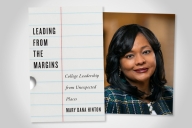You have /5 articles left.
Sign up for a free account or log in.
Many academics were victims of McCarthyism during the Cold War, and philosophers in particular were among the key targets in the early days of the Red scare. The Philosophy Scare: The Politics of Reason in the Early Cold War (University of Chicago Press) explores how and why philosophy was a target. The author is John McCumber, a professor of Germanic languages at the University of California, Los Angeles. Via email, he answered questions about his new book.
Q: Why do you think philosophy was an early target, as opposed to fields that might have been easier for politicians to understand?
A: There were a couple of things that put philosophy front and center as the Cold War began. Religious conservatives had for a while been openly targeting philosophy as the only discipline in the university where atheism might be taught (this cost Bertrand Russell a job at City College of New York in 1940). There was also a feeling that capitalism did not have a philosophical basis to rival the prestige and vigor of Marxism, especially in Western Europe. Philosophy, some felt, should supply it. Philosophy was also at an institutionally weak moment. Its long alliance with American religion was coming to an end, but it had retained from that relationship a critical relationship to science. It was without powerful academic allies.
Q: How did Max Otto’s appointment become a controversy? What was the significance of the attacks on Otto?
A: Max Otto was a prominent Wisconsin philosopher whose appointment to a visiting professorship at UCLA came to the attention of The Los Angeles Examiner, a major newspaper. They published a prominent article on it, highlighting Otto’s open atheism, which led to a letter-writing campaign against him. This may have cost him the job, and in any case was traumatic for him and for the UCLA philosophy department’s chair, Donald Piatt.
This affair and others seem to have led philosophers and philosophy departments to act in “stealthy” ways not easily discernible to outsiders. Philosophers published less in public places. They hid atheistic (or “naturalistic” views) under a technical discourse on the structure of science (“reductionism”). Philosophy departments tended to hire people they already knew personally. Course descriptions in university catalogs -- the main way outsiders could discover what was being taught in a given department -- were edited to make people seem more theistic than they were.
Q: Many academics were attacked during the Cold War. Was the response in philosophy similar or different to the responses in other disciplines?
A: The study of how different disciplines reacted to Cold War political pressures is in its infancy, so we cannot know in detail. We know that the overall pattern in California showed first regents and upper administrators (presidents and chancellors) ceasing to defend intellectual freedom in their universities, followed by capitulation from lower-ranking administrators (deans) and from the faculty itself. There is no currently known case of effectual response, and no reason to think this was not the pattern throughout the country. More research, however, is needed.
Q: What types of philosophy were most damaged during the Cold War?
A: Cold War pressures favored a philosophy that absolutized individual freedom of choice, instead of seeing individuals as situated in a social order and bound by duties to others; that underplayed or disregarded the nontheistic tendencies of modern thought; and that could facilitate Red-hunting by espousing a single, monolithic view of rational method, so that anyone not following such a method could be condemned as “incompetent” and quickly fired without raising issues of censorship. Marxism obviously could not conform to these demands, but two other paradigms, existentialism and pragmatism, also suffered. Both viewed philosophers as having moral obligations to society, were openly atheistic and -- while many of their adherents allied themselves with science -- did not view science as following any single method. Pragmatism fell into decline in American philosophy departments, while existentialism made few serious inroads into them.
Q: How can we see the impact of these Cold War attacks in academic departments today?
A: Cold War philosophy and the reactions to it affected the entire nation. Within universities, the ’60s saw a visceral reaction against the Cold War view of reason as the “objective” (i.e., dispassionate) deployment of a single method, but all kinds of departments, schooled in what suddenly became the old ways, could only see the newly concrete concerns and particularist strategies of African-Americans, feminists and LGBT people as abandonments of reason itself. The result is that the newer approaches found other homes, in programs such as African-American, women’s, Jewish and LGBT studies, while Cold War philosophy persists today in many traditional departments. With the Cold War now decades in the past, it may be time to revisit this arrangement.








